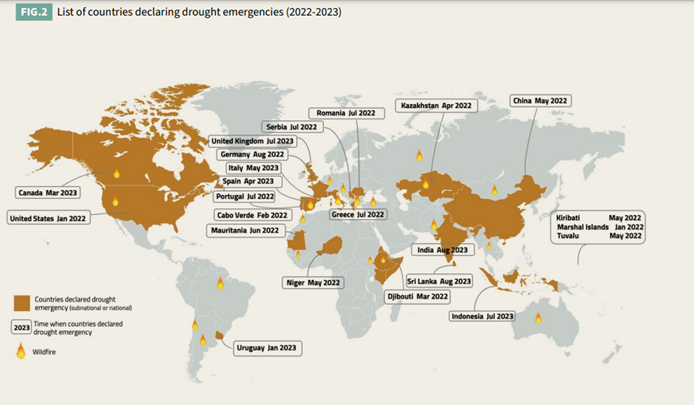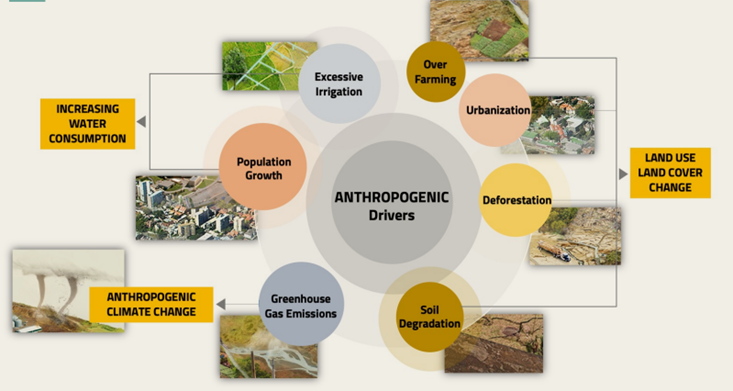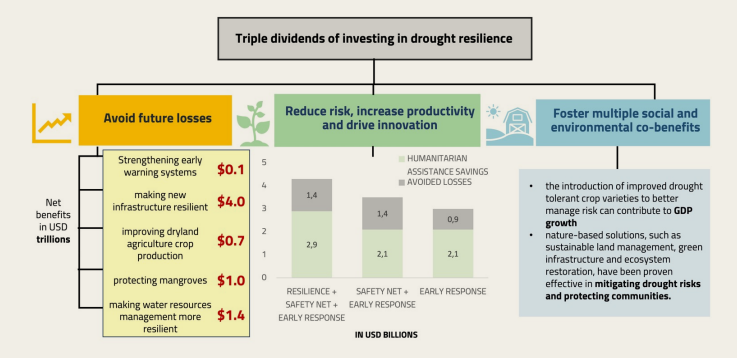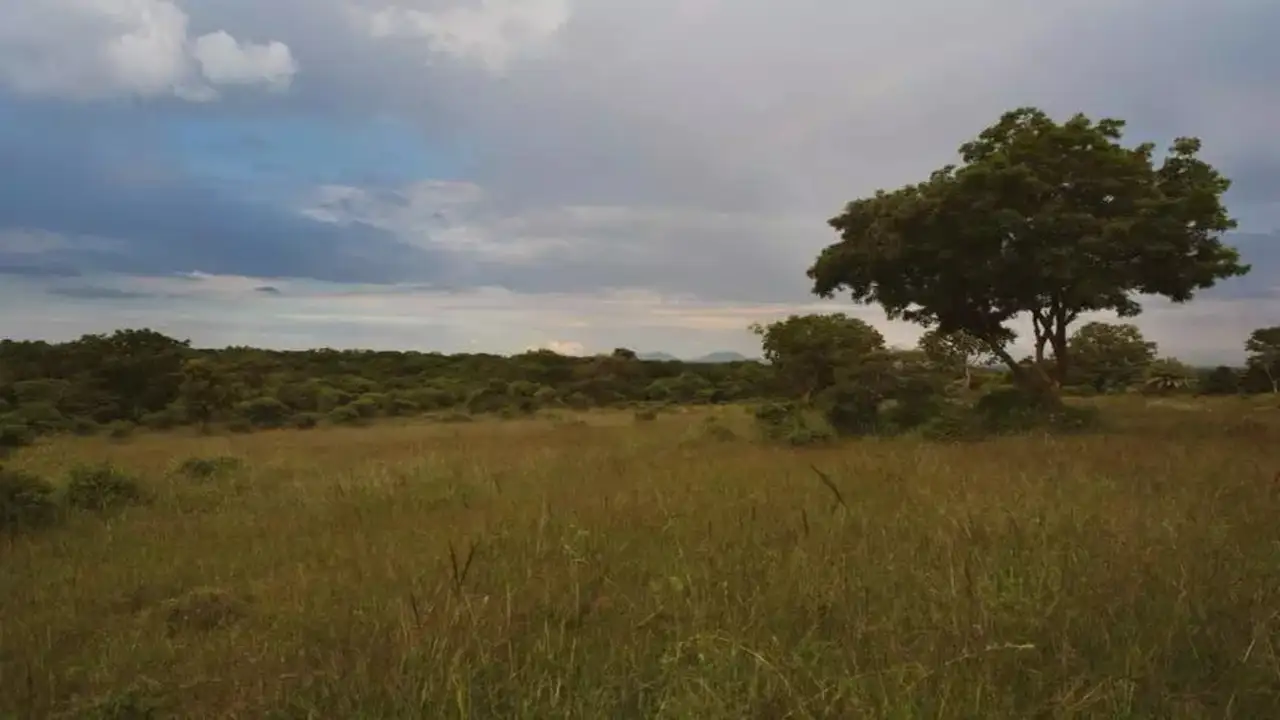- Courses
- GS Full Course 1 Year
- GS Full Course 2 Year
- GS Full Course 3 Year
- GS Full Course Till Selection
- Online Program
- GS Recorded Course
- NCERT (Recorded 500+ Hours)
- Polity Recorded Course
- Geography Recorded Course
- Economy Recorded Course
- AMAC Recorded Course
- Modern India, Post Independence & World History
- Environment Recoded Course
- Governance Recoded Course
- Science & Tech. Recoded Course
- International Relations and Internal Security Recorded Course
- Disaster Management Module Course
- Ethics Recoded Course
- Essay Recoded Course
- Current Affairs Recoded Course
- CSAT
- 5 LAYERED ARJUNA Mentorship
- Public Administration Optional
- ABOUT US
- OUR TOPPERS
- TEST SERIES
- FREE STUDY MATERIAL
- VIDEOS
- CONTACT US
Drought Emergency Declared by 23 Countries: Global Drought Snapshot Report 2023
Drought Emergency Declared by 23 Countries: Global Drought Snapshot Report 2023
22-01-2024
Context :
According to the Global Drought Snapshot 2023 report by the United Nations Convention to Combat Desertification (UNCCD), a total of 23 countries, including India, officially declared drought emergencies either at the national or sub-national level in the 2022-23 period.
Defining Drought:
- Drought is an extended period of low precipitation within the natural climate cycle and can manifest globally. Key Characteristics: It represents a gradual-ons
 et calamity marked by insufficient rainfall, leading to a scarcity of water resources.
et calamity marked by insufficient rainfall, leading to a scarcity of water resources. - The India Meteorological Department (IMD) characterizes a meteorological drought in a specific region when the rainfall deficit is equal to or exceeds 25% of its long-term normal.
- This classification is then subdivided into moderate and severe droughts based on the extent of the deficit.
- The impacts of droughts extend across various domains, encompassing diminishing reservoir capacities, reduced agricultural yields, biodiversity loss, and potential famines. Additionally, regions heavily reliant on agriculture may experience significant economic repercussions due to the severity of droughts.
- According to the Climate Hazards and Vulnerability Atlas of India by IMD, 87% of districts and 93% of the population are categorized as moderately to highly vulnerable.
About UNCCD
- In 1992, a resolution was adopted by the UN General Assembly, leading to the establishment of UNCCD in 1994 with its Headquarter in Bonn, Germany.
- It stands as the sole legally binding framework established to tackle desertification and the impacts of drought.
- Its mission is to safeguard and restore our land, ensuring a future that is safer, equitable, and more sustainable.
- It has 197 members including India.
- The supreme governing body of this organization is the Conference of the Parties (COP), which convened its inaugural session in 1997 in Rome, Italy.
Current Drought Impacts as Stated in the Report:
- Global Ramifications: The report, drawing data from 101 country Parties to the UNCCD, reveals that 1.84 billion individuals are affected by drought, with 4.7% facing severe or extreme conditions.
- Effects on Women and Children: Compared to men, women and children face a risk over 14 times higher of succumbing to climate-fueled disasters, exposing them to additional vulnerabilities. Beyond direct threats to their lives, disasters pose various protection risks to women.
- Impact on Food Security: By the end of December 2022, the ongoing drought had left approximately 23 million people severely food insecure in the Horn of Africa.
- Triggering Forced Migration: Weather-related hazards, including storms, floods, and droughts, accounted for 98% of the 32.6 million new disaster-induced displacements in 2022.
- Effects on Primary Energy Production: Notably, hydropower installations may be adversely affected as water scarcity hampers their proper operation.
- Consequences for Forests: Droughts contributed to a 7.6% increase in deforestation compared to normal weather years.
- Agricultural Impact: Over the past three decades, land degradation has resulted in a 0.4% annual reduction in global productivity for both irrigated and rainfed crops.
- Himalayan Glacier Impact: Glaciers in the Himalayas have experienced substantial mass loss over the last 40 years, with the rate accelerating. In 2022, exceptionally warm and dry conditions exacerbated the mass loss for most glaciers.

Recommendations from the Report:
- Embrace Sustainable Development: Opting for sustainable development can result in a 70% reduction in population exposure to drought compared to fossil-fuelled development.
- Expand Insurance Coverage for Drought-Related Losses: With approximately 45% of global disaster-related losses insured in 2020, up from 40% between 1980 and 2018, there is room for further scaling up insurance coverage.
- Promote Rainwater Harvesting: In urban areas, only about 15% of rainwater infiltrates the ground, while in rural areas, this figure rises to 50%. Encouraging rainwater harvesting offers an efficient method to store and reuse rainwater during drought periods.
- Harness the International Financial System: Addressing poverty and mitigating gross inequality through the international financial system can prevent regional societal collapse driven by food insecurity and environmental degradation.
- Adopt Nature-Based Solutions: Leveraging nature-based solutions has the potential to reduce carbon dioxide emissions by up to 25%.
Implemented Initiatives:
On Global level:
- "30x30" Target: A collective agreement by 195 nations to protect and restore a minimum of 30% of Earth's land and water by 2030, as per the Convention on Biological Diversity.
- Early Warning for All: The United Nations Secretary-General has set a goal to establish global coverage with early warning systems by 2027.
- International Drought Resilience Alliance (IDRA): Launched during the UNFCCC COP27 Leaders' Summit in 2022, this collaborative platform focuses on enhancing resilience to drought.
- UN Decade on Ecosystem Restoration: Aiming to fulfill commitments to restore 1 billion hectares of land by 2030.
On National level:
- National Disaster Management Guidelines – Management of Drought: Recommends a range of measures, including the implementation of an early warning system and capacity building.
- Manual for Drought Management 2016 (updated in 2020): Released by the Union government, it incorporates the use of modern technology for monitoring and determining drought conditions.
- Centrally Sponsored Schemes (CSS) / Central Sector (CS) Schemes: Includes initiatives like the Pradhan Mantri Krishi Sinchai Yojana and Rainfed Area Development Programme.




